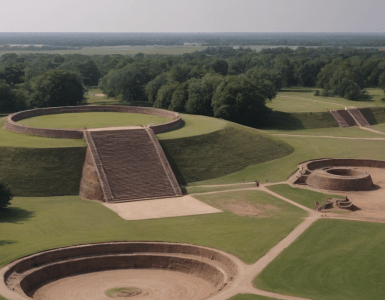¿Se ha preguntado alguna vez por qué hacemos las cosas que hacemos? ¿Por qué persisten ciertas tradiciones o por qué acontecimientos aparentemente aleatorios dieron forma a culturas enteras? La Historia no es sólo una lista de reyes y reinas; es un caótico e hilarante revoltijo de coincidencias, costumbres extrañas y conexiones inesperadas que han tejido el rico tapiz de la civilización humana. Sumerjámonos en algunos vínculos sorprendentes entre prácticas culturales y acontecimientos históricos: ¡prepárese para un viaje salvaje!
El sorprendente poder de la patata
Si piensa en Irlanda, probablemente pensará en patatas. Pero la humilde patata no siempre fue un alimento básico. Su llegada a Europa desde América cambió las reglas del juego. De repente, Irlanda disponía de una fuente de alimentos baratos y ricos en calorías, lo que provocó un boom demográfico. Este auge, irónicamente, preparó el terreno para la Gran Hambruna de la década de 1840, cuando una plaga de la patata acabó con la cosecha, provocando la hambruna y la emigración masivas. La patata, un símbolo de vida, se convirtió en un símbolo de muerte, un crudo recordatorio de cómo un solo cultivo puede cambiar radicalmente el destino de una nación.
La invención accidental del champán
El champán, esa burbujeante bebida de celebración, no se creó intencionadamente. En el siglo XVII, los viticultores de la región francesa de Champaña se enfrentaron a un problema: su vino fermentaba continuamente y producía burbujas. Inicialmente considerado un defecto, acabó convirtiéndose en la característica definitoria de la bebida. Un feliz accidente. Sin el tiempo impredecible y la segunda fermentación involuntaria, quizá estaríamos brindando con algo mucho menos emocionante.
El curioso caso del tenedor
Los tenedores no siempre fueron el utensilio omnipresente que son hoy en día. Su adopción en Europa fue lenta y encontró resistencia. Algunos los consideraban afeminados, mientras que otros los veían como un signo de decadencia. El auge del tenedor se debió en parte a la fascinación del Renacimiento italiano por los modales refinados en la mesa, pero también refleja un cambio más amplio en las prácticas sociales y culinarias. Piénselo: el humilde tenedor, antes símbolo de extravagancia, está ahora en todas las mesas. ¿Cómo construyeron las pirámides los antiguos egipcios?
El inesperado legado de las Cruzadas
Las Cruzadas, esas guerras de motivación religiosa entre cristianos y musulmanes, tuvieron un impacto profundo e inesperado en la cultura europea. Aunque a menudo se describen como un periodo de conflicto religioso, las Cruzadas también facilitaron el intercambio de ideas, bienes y tecnologías entre Oriente y Occidente. Los cruzados trajeron nuevos alimentos (¡como la pasta!), especias y estilos arquitectónicos, enriqueciendo a la sociedad europea de formas imprevistas. ¿Quién iba a pensar que una guerra religiosa podría ser tan enriquecedora culturalmente?
Los extraños orígenes de Halloween
Los espeluznantes orígenes de Halloween se remontan a la antigua fiesta celta de Samhain. Celebrado en torno al 31 de octubre, Samhain marcaba el final del verano y de la cosecha, y se creía que era un momento en el que la frontera entre los vivos y los muertos se difuminaba. Las tradiciones de "truco o trato" y de disfrazarse han evolucionado a lo largo de los siglos, mezclando creencias celtas con influencias cristianas. Así que, la próxima vez que trinche una calabaza o se ponga un disfraz terrorífico, recuerde a los antiguos celtas y su espeluznante celebración.
Platos sorprendentemente diversos de la Ruta de la Seda
La Ruta de la Seda, una red de rutas comerciales que conectaban Oriente y Occidente, no era sólo seda. Era un conducto para el intercambio de ideas, religiones y, lo que es más importante para nuestros estómagos, ¡comida! Ingredientes como los fideos, las especias y las frutas viajaron enormes distancias, influyendo en las cocinas de todos los continentes. Muchos de los platos que disfrutamos hoy en día deben su existencia, o al menos sus sabores únicos, al intercambio cultural de la Ruta de la Seda. Piensa en la fusión de influencias chinas e italianas en tus platos de pasta favoritos.
Las consecuencias imprevistas de la imprenta
La imprenta de Gutenberg revolucionó la comunicación y la difusión de la información. La capacidad de producir libros en masa democratizó el conocimiento, fomentando la alfabetización y desafiando las estructuras de poder establecidas. Pero la imprenta también tuvo consecuencias imprevistas. La difusión de ideas radicales alimentó convulsiones religiosas y políticas, demostrando cómo los avances tecnológicos pueden tener ramificaciones sociales imprevistas.
Auge y caída del Imperio Romano (y su sorprendente impacto en el lenguaje)
El colapso del Imperio Romano dejó un legado persistente en las lenguas habladas en Europa y más allá. Lenguas romances como el francés, el español y el italiano son descendientes directas del latín, la lengua del Imperio Romano. Palabras como "calle" (de "strata") y "calendario" (de "calendarium") son vestigios cotidianos de la influencia de Roma en la vida moderna. Esto nos recuerda que incluso la poderosa caída deja tras de sí ecos duraderos, aunque a veces sutiles.
La inesperada influencia de los piratas en la lengua inglesa
Los piratas de capa y espada de los siglos XVII y XVIII enriquecieron sin querer la lengua inglesa. Muchos términos y frases náuticas que utilizamos hoy en día tienen su origen en la jerga pirata. Palabras como "booty" (botín) y "marooned" (abandonado) se han colado en la conversación cotidiana, testimonio de la sorprendente influencia de los piratas en nuestro vocabulario.
La historia y la cultura están intrincadamente entrelazadas, una compleja danza de acontecimientos, ideas y personas. Desde la humilde patata hasta el poderoso Imperio Romano, acontecimientos aparentemente insignificantes han tenido a menudo consecuencias profundas y duraderas. Explorar estas conexiones inesperadas nos recuerda que la historia no es sólo el pasado; es una entidad viva y palpitante que configura nuestro presente y nuestro futuro de formas de las que a menudo no nos damos cuenta.

























Añadir un comentario